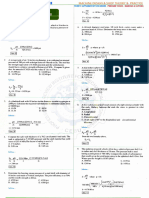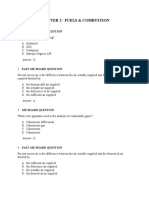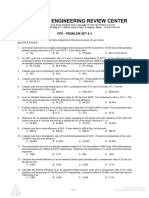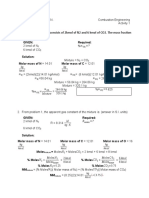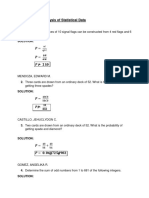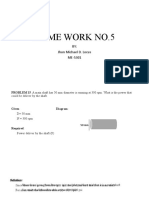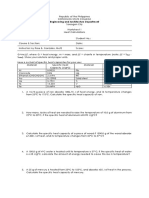80%(5)80% found this document useful (5 votes)
9K views61 66
61 66
Uploaded by
KhietThe document contains 6 chemistry problems and their step-by-step solutions. Problem 1 calculates the change in internal energy of 5 lbs of oxygen when temperature increases from 100°F to 120°F. Problem 2 calculates the rate of temperature change of 1 kg of water when heated by a 1500W heater. Problem 3 calculates the temperature change of 1 kg of water heated by 300 BTUs. Problem 4 calculates the change in enthalpy per pound of nitrogen as its temperature decreases from 500°F to 200°F.
Copyright:
© All Rights Reserved
Available Formats
Download as PPTX, PDF, TXT or read online from Scribd
61 66
61 66
Uploaded by
Khiet80%(5)80% found this document useful (5 votes)
9K views6 pagesThe document contains 6 chemistry problems and their step-by-step solutions. Problem 1 calculates the change in internal energy of 5 lbs of oxygen when temperature increases from 100°F to 120°F. Problem 2 calculates the rate of temperature change of 1 kg of water when heated by a 1500W heater. Problem 3 calculates the temperature change of 1 kg of water heated by 300 BTUs. Problem 4 calculates the change in enthalpy per pound of nitrogen as its temperature decreases from 500°F to 200°F.
Original Description:
Engr. Romnick
Original Title
61-66
Copyright
© © All Rights Reserved
Available Formats
PPTX, PDF, TXT or read online from Scribd
Share this document
Did you find this document useful?
Is this content inappropriate?
The document contains 6 chemistry problems and their step-by-step solutions. Problem 1 calculates the change in internal energy of 5 lbs of oxygen when temperature increases from 100°F to 120°F. Problem 2 calculates the rate of temperature change of 1 kg of water when heated by a 1500W heater. Problem 3 calculates the temperature change of 1 kg of water heated by 300 BTUs. Problem 4 calculates the change in enthalpy per pound of nitrogen as its temperature decreases from 500°F to 200°F.
Copyright:
© All Rights Reserved
Available Formats
Download as PPTX, PDF, TXT or read online from Scribd
Download as pptx, pdf, or txt
80%(5)80% found this document useful (5 votes)
9K views6 pages61 66
61 66
Uploaded by
KhietThe document contains 6 chemistry problems and their step-by-step solutions. Problem 1 calculates the change in internal energy of 5 lbs of oxygen when temperature increases from 100°F to 120°F. Problem 2 calculates the rate of temperature change of 1 kg of water when heated by a 1500W heater. Problem 3 calculates the temperature change of 1 kg of water heated by 300 BTUs. Problem 4 calculates the change in enthalpy per pound of nitrogen as its temperature decreases from 500°F to 200°F.
Copyright:
© All Rights Reserved
Available Formats
Download as PPTX, PDF, TXT or read online from Scribd
Download as pptx, pdf, or txt
You are on page 1of 6
At a glance
Powered by AI
The passages discuss various thermodynamic concepts and calculations related to changes in temperature, internal energy, enthalpy, and rate of temperature change when heating substances.
To calculate the change in internal energy, one uses the formula ΔU = mCvΔT, where m is the mass, Cv is the specific heat at constant volume, and ΔT is the change in temperature.
To calculate the rate of temperature change when heating a substance, one uses the formula ΔT/Δt = Q/mCv, where Q is the heat input, m is the mass, and Cv is the specific heat at constant volume.
61.
Find the change in internal energy of 5lbm of oxygen
when the temperature changes from 100F to 120F,
Cv = 0.157 Btu/lbm-R.
a. 14.70 Btu
c. 16.80 Btu
b. 15.70 Btu
d. 147 Btu
Solution:
U = mCvT
T2 = 120F =[120F]+459.67 = 579.67 R
T1 = 100C = [100F]+459.67 = 559.67 R
m = 5 lbm
Cv = 0.157 Btu/lbm-R
= (5lbm)*(0.157 Btu/lbm-R)*(579.67-559.67 R)
= 15.70 Btu (b)
62. Water (Specific heat, Cv = 4.2 kJ/kg-K) is being heated
by 1500-W heater. What is the rate of change in
temperature of 1 kg of water?
a. 0.043 Kelvin/s
c. 0.357 Kelvin/s
b. 0.179 Kelvin/s
d. 1.50 Kelvin/s
Solution:
Q = mCvT
T = Q/mCv
Q = 1500 watts = 1.5 kw = 1.5 kJ/s
Cv = 4.2 kJ/kg-K
m = 1 kg
T = (1.5 kJ/s)/(1 kg * 4.2 kJ/kg-K)
= 0.357 K/s (c)
63. One kilogram of water (Cv = 4.2 kJ/kg-K) is heated by
300 Btu of energy. What is the change in temperature
in K?
a. 75.36 K
c. 73.80 K
b. 125.20 K
d. 17.96 K
Solution:
Q = mCvT
T = Q/mCv
m = 1 kg
Cv = 4.2 kJ/kg-K
Q = 300 Btu (1.055 kJ/Btu) = 316.50 kJ
T = 316.50 kJ / (1 kg * 4.2 kJ/kg-K)
= 75.36 K (a)
64. Determine the change in enthalpy per lb mass of
nitrogen gas as its temperature changes from 500F to
200F. (Cp = 0.2483 Btu/lbm-R)
a. 74.49 Btu/lbm
c. 68.47 Btu/lbm
b. 72.68 Btu/lbm
d. 63.78 Btu/lbm
Solution:
Q = h
h = mCp T ; h/m = Cp T
Cp = 0.2483 Btu/lbm
T2 = 200F =[120F]+459.67 = 659.67 R
T1 = 500C = [100F]+459.67 = 959.67 R
h/m = (0.2483 Btu/lbm) * (659.67-959.67 R)
= - 74.49 Btu/lbm (a)
65. Calculate the change in enthalpy as 1 kg of nitrogen is heated from
1000 K to 1500 K, assuming the nitrogen is an ideal gas at a constant
pressure. The temperature dependent specific heat of nitrogen is
Cp = 39.06 512 T^(-1.5) + 1072.7 T^(-2) 820.4 T^(-3) where Cp is in
kJ.kg-mol, and T is in K.
a. 600 kJ
b. 697.27 kJ
c. 800 kJ
d. 897.27 kJ
Solution:
Cp = h / T ; h = Cp * T
Cp = 39.06 512 T^(-1.5) + 1072.7 T^(-2) 820.4 T^(-3)
T : T2 = 1500 , T1 = 1000
h = Cp * T
66. What is the resulting pressure when one pound of air at
15 psia and 200F is heated at constant volume to 800F?
a. 15 psia
c. 36.4 psia
b. 28.6 psia
d. 52.1 psia
Solution:
P1/T1 = P2/T2
P2 = (P1*T2) / T1
P2 = ( 15 psia * (800+460) ) / (200+460)
= 28.64 psia (b)
You might also like
- Board Exam1Document103 pagesBoard Exam1MJ Pineda59% (17)
- Pressure Vessels Bearings and Clutches Solution ManualDocument11 pagesPressure Vessels Bearings and Clutches Solution ManualAIKA100% (2)
- Board Problems 2Document11 pagesBoard Problems 2Josue Carubio Ricalde Jr.100% (2)
- (Prob Sets) HEAT TRANSFERDocument10 pages(Prob Sets) HEAT TRANSFERStephanie Park40% (5)
- MD Refresher 1 Notes FinalDocument154 pagesMD Refresher 1 Notes FinalVictor CapistranoNo ratings yet
- Thermo KJDocument6 pagesThermo KJKhiet0% (4)
- DIAGNOSTIC EXAMINATION SET A ANSWER KEY With SOLUTIONS PDFDocument4 pagesDIAGNOSTIC EXAMINATION SET A ANSWER KEY With SOLUTIONS PDFJads CayabyabNo ratings yet
- Pipe AlcorconDocument86 pagesPipe AlcorconIshmael Torres67% (3)
- Lagrisola EXAMDocument93 pagesLagrisola EXAM3 stacks100% (2)
- Mathematics, Economics, Sciences Instruction:: Final Coaching Exam 05 - Mesl ProbsDocument10 pagesMathematics, Economics, Sciences Instruction:: Final Coaching Exam 05 - Mesl ProbsManoy Bermeo50% (2)
- Thermo 12Document19 pagesThermo 12Jess Ryan Olayon100% (2)
- II. Multiple Choice Problem Solving Compilations With SolutionsDocument55 pagesII. Multiple Choice Problem Solving Compilations With SolutionsRamel DionzonNo ratings yet
- Worded Problems in Thermodynamics 1 2Document12 pagesWorded Problems in Thermodynamics 1 2Jonel Santos60% (10)
- Boardwork No.1 and 2Document9 pagesBoardwork No.1 and 2John Nalog100% (1)
- PIPE Solving 1Document35 pagesPIPE Solving 1monNo ratings yet
- Power Plant Problems LFDocument72 pagesPower Plant Problems LFApril Abellana100% (3)
- Welding Procedure Specification (WPS) (QW-482) : PPI/L&T/WPS/013Document5 pagesWelding Procedure Specification (WPS) (QW-482) : PPI/L&T/WPS/013Rajesh Owaiyar100% (1)
- The Microscope and Its Use: Lab ReportDocument4 pagesThe Microscope and Its Use: Lab ReportArbab GillNo ratings yet
- 80 81,84 86,87 88,95 97Document5 pages80 81,84 86,87 88,95 97Ivy Joy Ubina100% (1)
- TRANSPORTMECHANICSDocument20 pagesTRANSPORTMECHANICSEfraim AbuelNo ratings yet
- MD StressesDocument34 pagesMD StressesAdriel John50% (2)
- AnswerDocument1 pageAnswerLaurence Lee Advento100% (1)
- Cuison Chapter 2Document41 pagesCuison Chapter 2Reinzo Gallego100% (1)
- Alcorcon Engineering Review Center: Ppe - Problem Set # 3Document3 pagesAlcorcon Engineering Review Center: Ppe - Problem Set # 3Juan T Amad100% (1)
- An Ideal Gas Mixture Consists of 2kmol of N2 and 6 Kmol of CO2. The Mass Fraction of CO2 IsDocument9 pagesAn Ideal Gas Mixture Consists of 2kmol of N2 and 6 Kmol of CO2. The Mass Fraction of CO2 IsLance Andrew LagmanNo ratings yet
- A. 169.7 MpaDocument46 pagesA. 169.7 MpaBrilliantJohnMalandacRubiaNo ratings yet
- Oct 18 SeatworkDocument24 pagesOct 18 SeatworkEasy WriteNo ratings yet
- USA Elementary Steady Flow Chapter 05Document3 pagesUSA Elementary Steady Flow Chapter 05Fernan MacusiNo ratings yet
- Algebraic MethodDocument3 pagesAlgebraic Methodstephen james100% (1)
- Sokution Macihne DesDocument39 pagesSokution Macihne DesSunde PascuaNo ratings yet
- MD in House Set 1 4 1Document12 pagesMD in House Set 1 4 1Mark Juren AlbaoNo ratings yet
- Question: Two Walls of A Storage Plant Composed of Insulating Material (Document3 pagesQuestion: Two Walls of A Storage Plant Composed of Insulating Material (MelindaNo ratings yet
- Orca Share Media1519993790396 PDFDocument10 pagesOrca Share Media1519993790396 PDFSecret SecretNo ratings yet
- 39parato - Variable LoadDocument2 pages39parato - Variable LoadNeal Christian Parato83% (6)
- SABUERO-ME62-Board Exam AssignmentDocument39 pagesSABUERO-ME62-Board Exam AssignmentJohn Westly S. Sabuero50% (2)
- Machine Design Examination 9Document5 pagesMachine Design Examination 9SYBRELLE CRUZNo ratings yet
- PPE Coaching ProblemsDocument37 pagesPPE Coaching ProblemsYato QtNo ratings yet
- ReviewerDocument8 pagesReviewermaylynXiXNo ratings yet
- (Solved Problems) : Thermodynamics 01Document6 pages(Solved Problems) : Thermodynamics 01Ben0% (1)
- PIPE Solving 2-5Document28 pagesPIPE Solving 2-5monNo ratings yet
- THERMODYNAMICS 1 Rev 2Document62 pagesTHERMODYNAMICS 1 Rev 2Jads Cayabyab100% (2)
- Additional Example For Lecture 1Document1 pageAdditional Example For Lecture 1nadia_shuhada_2No ratings yet
- (Solved Problems) : Thermodynamics 02Document7 pages(Solved Problems) : Thermodynamics 02BenNo ratings yet
- Week 5 & 6Document10 pagesWeek 5 & 6Mariel MirafloresNo ratings yet
- Stresses ProblemsDocument4 pagesStresses ProblemsEu Aumentado100% (1)
- 29.1 Belts, Chain - Sprockets, - Threaded Members SolutionsDocument11 pages29.1 Belts, Chain - Sprockets, - Threaded Members SolutionsMarcelo AmandoronNo ratings yet
- Deophantine 6Document169 pagesDeophantine 6Caro Kan LopezNo ratings yet
- Home Work No.5: BY: Jhun Michael D. Locus ME-5301Document6 pagesHome Work No.5: BY: Jhun Michael D. Locus ME-5301Jhun Michael LocusNo ratings yet
- Dela Cruz, John Matthew P. Thermodynamics CompletionDocument8 pagesDela Cruz, John Matthew P. Thermodynamics CompletiongiamaureendelrosarioNo ratings yet
- 53 65Document3 pages53 65Von A. DamirezNo ratings yet
- Instruction: Answer The Following Problems. Please Try To Time Yourself in Solving The ProblemDocument2 pagesInstruction: Answer The Following Problems. Please Try To Time Yourself in Solving The ProblemJerson OceraNo ratings yet
- Ipd PPD Problem2Document16 pagesIpd PPD Problem2Josue Carubio Ricalde Jr.100% (1)
- Exercises Problem No. 1 Flat BeltsDocument3 pagesExercises Problem No. 1 Flat BeltsAriel GamboaNo ratings yet
- MEEN 20052 - Week 2 - Salamat, Andre Agassi D.Document4 pagesMEEN 20052 - Week 2 - Salamat, Andre Agassi D.andreagassiNo ratings yet
- MATH4Document5 pagesMATH4DayLe Ferrer AbapoNo ratings yet
- Sample ProblemsDocument8 pagesSample ProblemsKenn Earl Bringino VillanuevaNo ratings yet
- ThermoDocument17 pagesThermoAira Krizelle100% (1)
- Problem Set No 1pdfpdf PDF FreeDocument87 pagesProblem Set No 1pdfpdf PDF FreeMaria Perez100% (1)
- Seatwork No. 2Document3 pagesSeatwork No. 2Allen DagsilNo ratings yet
- Quantity of HeatDocument40 pagesQuantity of HeatKiel JohnNo ratings yet
- 15.1 250 KG/H of Air Saturated at 2°C Is Mixed With 50 KG/H of Air at 35°C and 80% RHDocument17 pages15.1 250 KG/H of Air Saturated at 2°C Is Mixed With 50 KG/H of Air at 35°C and 80% RHNathan EscobalNo ratings yet
- Chapter17 PDFDocument42 pagesChapter17 PDFJason B PamatmatNo ratings yet
- Blood VesselsDocument28 pagesBlood VesselsKhietNo ratings yet
- Don Bosco Technology Center: Group Adviser: Engr. Romnick Villanueva Remarks/CommentsDocument1 pageDon Bosco Technology Center: Group Adviser: Engr. Romnick Villanueva Remarks/CommentsKhietNo ratings yet
- Don Bosco Technical College Cebu Inc.: Name of CandidatesDocument2 pagesDon Bosco Technical College Cebu Inc.: Name of CandidatesKhietNo ratings yet
- List of Registered Importers of Ozone Depleting Substances and Its Alternative Chemicals 2015-2016Document5 pagesList of Registered Importers of Ozone Depleting Substances and Its Alternative Chemicals 2015-2016KhietNo ratings yet
- Process Selection and Facility LayoutDocument59 pagesProcess Selection and Facility LayoutKhietNo ratings yet
- Decision Theory: Mcgraw-Hill/IrwinDocument21 pagesDecision Theory: Mcgraw-Hill/IrwinKhiet100% (2)
- Decision Theory: Mcgraw-Hill/IrwinDocument21 pagesDecision Theory: Mcgraw-Hill/IrwinKhiet100% (2)
- 2024 - MTRL 494 - Assignment 4Document3 pages2024 - MTRL 494 - Assignment 4vjscricNo ratings yet
- Pressure Method - AASHTO T 152 (ASTM C231)Document5 pagesPressure Method - AASHTO T 152 (ASTM C231)Einstein JeboneNo ratings yet
- Worksheet #1Document2 pagesWorksheet #1Sethe AllenNo ratings yet
- 068 - Physics hw-6Document8 pages068 - Physics hw-6Jesse LuNo ratings yet
- Kinetika Kimia Orde 1Document24 pagesKinetika Kimia Orde 1ayu mauliraNo ratings yet
- Use of The TephigramDocument16 pagesUse of The TephigramCyclone warning centre VisakhapatnamNo ratings yet
- WangYC PDFDocument21 pagesWangYC PDFIvicaNo ratings yet
- Ada 242726Document307 pagesAda 242726Khan BabaNo ratings yet
- Booster Pump Head Loss CalculationDocument6 pagesBooster Pump Head Loss CalculationshoaibNo ratings yet
- Chilled Water System Introduction, MyanmarDocument20 pagesChilled Water System Introduction, MyanmaracmvorgNo ratings yet
- JM Custom Catalysts BrochureDocument6 pagesJM Custom Catalysts BrochureEvans Azka FNo ratings yet
- Precision Grouting of TurbomachineryDocument16 pagesPrecision Grouting of TurbomachineryReyes SanchezNo ratings yet
- Mizoguchi 2004Document5 pagesMizoguchi 2004Du NguyenNo ratings yet
- 16-Equilibrium Calculations Involving Units of KCDocument3 pages16-Equilibrium Calculations Involving Units of KCNkemzi Elias NzetengenleNo ratings yet
- TangkiDocument61 pagesTangkiCarey RichNo ratings yet
- Exciton Comsol Yao - PresentationDocument13 pagesExciton Comsol Yao - Presentationhhakim32No ratings yet
- Pedersen 2005Document6 pagesPedersen 2005Wisnu WijanarkoNo ratings yet
- Revision Summary of Unit 1,2,3,4Document106 pagesRevision Summary of Unit 1,2,3,4Reaktivic gaishnikovicNo ratings yet
- Chapter 24: Electromagnetic Waves and Nature of LightDocument2 pagesChapter 24: Electromagnetic Waves and Nature of LightAlarcon KendrickNo ratings yet
- Toop - Theory of Life Testing and Use of Thermogravimetric...Document13 pagesToop - Theory of Life Testing and Use of Thermogravimetric...namsaigon316No ratings yet
- HCS UncrackedDocument1 pageHCS Uncrackedcomandos882010No ratings yet
- Engineering Encyclopedia: Maintenance and Repair of Heat ExchangersDocument69 pagesEngineering Encyclopedia: Maintenance and Repair of Heat ExchangersAfzaalUmairNo ratings yet
- AISC-34 Gusset PlateDocument4 pagesAISC-34 Gusset PlateMartin Cristobal CupitayNo ratings yet
- CP 1Document22 pagesCP 1api-3757791100% (1)
- Effective Thickness of Laminated Glass BDocument15 pagesEffective Thickness of Laminated Glass BsaddamNo ratings yet
- Pump Shaft Repair Recommendation GuidelinesDocument4 pagesPump Shaft Repair Recommendation Guidelineschiz escudero100% (2)
- Journal of Sustainable Mining: Research PaperDocument13 pagesJournal of Sustainable Mining: Research PaperAlket DhamiNo ratings yet

